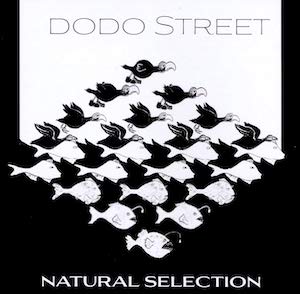 Dodo Street – Natural Selection
Dodo Street – Natural Selection
Extinct Records/Nimbus Alliance – 5 April 2019
Natural Selection is an album filled with passages of jaw-dropping instrumental brilliance, created by five musicians acknowledged, world-wide, as masters of their respective instruments. But neither of those statements prepare you for the musical roller-coaster ride you’re taken on when listening to the twelve tracks, nor do they alert you to the humour that pervades the album, from liner notes through track titles and on into the music itself. But can you categorise the music? Absolutely not, to quote from a conversation with two of the musicians responsible, Cormac Byrne: “I think it broaches the whole subject of pigeon holes and genres. What is this? What kind of musician are you?” Adam Summerhayes: [Interrupting] “No, Dodos are too big to fit in a pigeon hole.”
Having mentioned two of those responsible, let’s put the tricky business of pigeons and dodos to one side and first establish who has contributed to this remarkable album. Adam is a top-flight violinist renowned for his baroque interpretations, and also plays mandolin and melodeon on this album. Cormac, well-established in the folk world as the go-to percussionist, is also active in many other areas of music. Piers Adams plays recorders, and no matter how much recorder music you heard at school, nothing will have prepared you for Piers. Malcolm Creese is a master of the bass and has extensive recording credits both in popular and classical music to prove it. Murray Grainger contributed accordion, when the others let him, and joined with Adam and Cormac as album producers.
When I talked with Adam and Cormac at Costa del Folk this year, I’d just listened to Natural Selection for the first time. So, although our conversation was primarily about their improvised duo album, Stone Soup (reviewed here), I hoped they would enlighten me about the origins of Natural Selection. Adam gave the definitive answer:
“Well, the whole thing about Dodo Street is that it’s basically my music from my roots. I’ve got northeast stuff, I’ve got Celtic stuff, I’ve got the whole Jewish klezmery thing, with other bits of Eastern European stuff. That’s the music that’s always existed in my head, as a unit for me. So, if I sit and improvise it might start sounding Celtic, but it won’t, necessarily, by the time I finish. So, I just thought, well, I’m going to put this together… …and see if these guys will play it. …It doesn’t need defining and putting in different pigeon holes, just bung it together.”
The first track, Leave Me Alone, seems to fit this description perfectly. Opening with recorder and fiddle alternating phrases, the gentle tempo and ethereal pitch evoke a Celtic slow air. But just as the two instruments are coming together, the tempo abruptly switches and they’re joined by the accordion in a frenetic piece of klezmer mayhem, soon involving all the band. After a minute or so, the accordion and fiddle slow their pace, replacing the rapid, staccato notes with lengthy sweeping phrases that would fit the soundtrack for a slow pan following a train across the verdant countryside. The recorder has a go at slowing down its stream of notes but never quite makes it, and before long they’re all back up to klezmer pace. The fiddle then has a go at breaking loose and suddenly there’s a bit of an American hoedown going on. As the piece enters its final minute or so, with short bursts of all these elements, the recorder re-visits the slow air, but this time making sure we can identify echoes of the Wild Mountain Thyme tune. Certainly, all the components of Adam’s mixed ancestry are there, but what about the Americana? He can explain that, he’s been doing a lot of driving in America recently.
Other tracks can be rather more restrained than the opener, Neil Gow’s Lament, built around variations on a couple of Scottish airs, sticks to “slow and lyrical” throughout allowing the exceptional musicianship of all five to shine through. While, in marked contrast, there are pieces such as Larking, which lives up to its name, with noises coming from “instruments” both official and co-opted, producing a track reminiscent of Spike Jones. A set of well-known Celtic tunes, Ian Maclachlan’s Dark Island, Mike McGoldrick’s Watermans and Brendan McGlinchey’s Splendid Isolation is approached in a rather less experimental manner, Watermans is initially used to give Malcolm a bass solo and is also notable for being slowed right down from the way McGoldrick tackles it on his flute. And, to reverse the theme, they take Splendid Isolation much faster.
Throughout the album, it’s their absolute mastery of the instruments that shines through. While the virtuosity on display is breath-taking, it is the way that musical expertise is combined with a streak of anarchic fun that makes the album so entertaining. Humour pervades all aspects of the album and, so far as the sleeve text is concerned, the helpful inclusion of a dictionary definition of fake news gives fair warning. Don’t believe all you read, just listen to music that is both imaginative and rewarding and ponder how much fun these five musical geniuses must have had when making it.
Natural Selection is out now. Order via Amazon
For live dates visit: http://www.dodostreetband.com/
